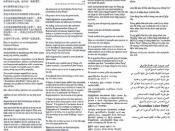Social Democratic parties in Western Europe were originally oriented around very socialistic doctrine, essentially existing as peoples' or workers' parties dedicated to achieving an egalitarian society. As the parties dedicated to this platform started to struggle, however, many changes ensued. The social democratic parties in Britain and Germany provide two prime examples of how these parties underwent a transformation in party doctrine after experiencing troubled periods of electoral failure. The factors that contributed to the electoral struggles, and thus to the platform changes, include the rise and success of the more conservative parties in these two nations, the challenges presented by new fringe parties, and the restructuring of the social order associated with these parties. Due to these particular issues, the social democratic parties have reoriented themselves and are much different than they were several decades ago.
"To match the new reality, social democratic parties have taken a series of steps to alter their programme, moving towards the political centre, abandoning much of the old statist model and accepting more fully the market economy."
(Keating 5)The Labor Party has traditionally been the social democratic party of Great Britain and it has experienced a great deal of change since the early 1980s. After Labor's third successive defeat in 1987, the leadership concluded that electoral recovery would require sweeping changes in policy and ideology (Shaw 160). This conclusion was also determined by the evident changes in social structure since the pinnacle of the Labor Party successes. Due to the very poor performance of the Labor party for nearly a decade, by the 1992 general elections the party had essentially changed all of the traditional policy commitments that the leadership concluded had distanced themselves from the general British constituency (Seyd 50). Then, under the leadership of Tony Blair, the British Labor party was...


